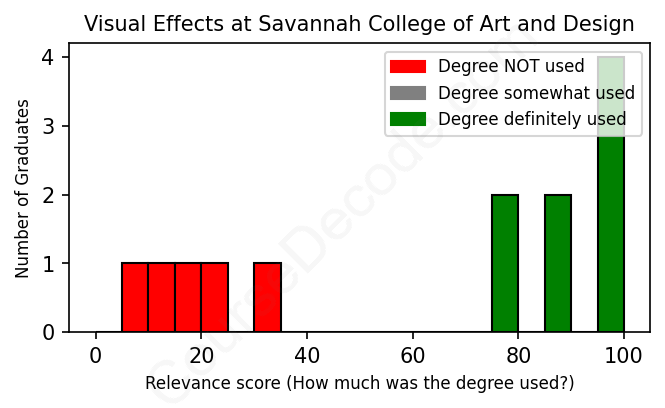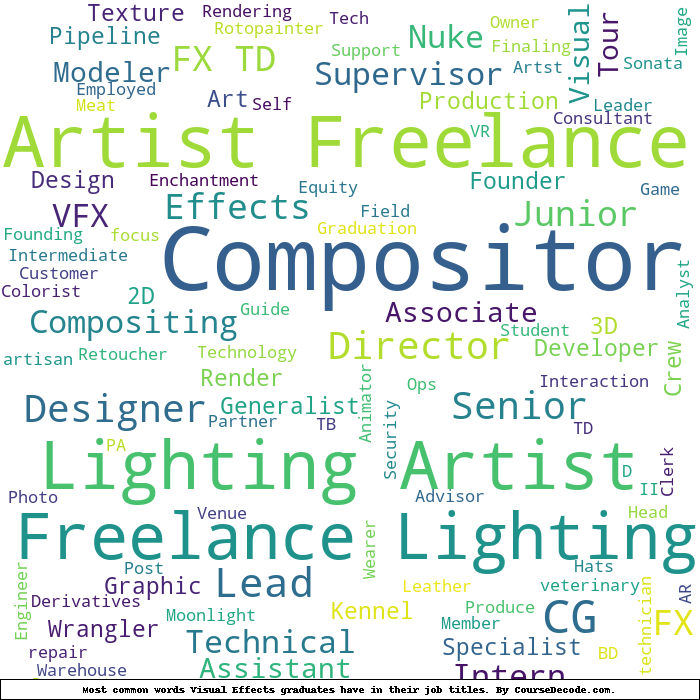
First, some facts. Of the Visual Effects graduates from Savannah College of Art and Design we've analyzed , here's how many have used (or NOT used) their degree in their career:

These are estimates based on AI analysis of 13 LinkedIn profiles (see below).
The verdict? Slightly below average. Overall, with an average relevance score of 62%, Visual Effects graduates from Savannah College of Art and Design have a slightly lower likelihood (-5%) of finding work in this field compared to the average graduate across all fields:
And for comparison, here's the chart for all profiles we've looked at across all degrees.
Also, after graduating, only 15% of these graduates have pursued further education other than another Bachelor's degree (such as a Masters degree or other), compared to the average across all profiles of 35%. This suggests a Bachelors degree is enough for most Visual Effects graduates, and it's normal to look for work straight after graduation.
See the details:
|
Relevance score: 6% We think this person has NOT gone into a career related to their degree. We think this person has NOT gone into a career related to their degree.
DEGREE INFOGraduated in 2018 from Savannah College of Art and Design with a Bachelor's in Visual Effects. Also pursued further education since (see below). JOB HISTORY SINCE GRADUATIONModeler SCAD Bumper Jan 2018 - Mar 2018 Modeler  1980's Visual Effects Studio Jan 2018 - Mar 2018 AR/VR Intern  Turner (Turner Broadcasting System, Inc) Jun 2018 - Sep 2018 Meat Clerk  Safeway Sep 2018 - Feb 2019 Security Supervisor  Security Industry Specialists Feb 2019 - Present Self Employed  Self-employed Jan 2022 - Present FURTHER DEGREES DONE SINCE GRADUATINGCertificateUniversity of Phoenix 2019 - 2020 ABOUTI graduated in 2018 with a Bachelor's in Visual Effects, have taken classes in cybersecurity and basic law, and am currently working on becoming a jack of all trades. Working in administration as a Security Supervisor, my eight years of customer service have proven their worth when answering questions from both clients and employees in a timely manner. Often taking the initiative to undertake projects that increase productivity and efficiency, I'm an excellent addition to any team. |
The top 10 most common jobs done by the graduates we've analyzed (ranked most common to least) are:
So, it looks like people who graduated with a Visual Effects degree from SCAD have generally landed jobs that are pretty closely tied to their field. The most common roles are in compositing and lighting, which are direct applications of their studies. For example, many have worked as Compositors or Lighting Artists, applying the specific techniques and tools they learned during their degree to create visual effects in films, games, and other media. These roles usually require really specialized skills like compositing techniques, texturing, and lighting strategies — all things taught in their classes. It's awesome to see that a lot of folks have been able to jump straight into these creative roles where they can fully utilize what they learned.
However, not everyone has stuck with the visual effects path. Some graduates have found themselves in jobs like graphic design, customer support, and even roles that have nothing to do with visual effects at all, such as tour directing or working in the food service industry. While some of these positions might touch on broader artistic skills, they often don't use the specific knowledge gained from the Visual Effects program. So, while a solid chunk of SCAD grads have pursued careers that align well with their degrees, there are also quite a few who have taken very different routes. It's a mixed bag, but overall, having a degree in Visual Effects seems to give them a decent foundation for entering relevant fields.
Here is a visual representation of the most common words in job titles for Visual Effects graduates (this is across all Visual Effects graduates we've analyzed, not just those who went to Savannah College of Art and Design):

Graduates from the Savannah College of Art and Design (SCAD) with a degree in Visual Effects generally kickstart their careers in entry-level roles focused on various aspects of visual production, such as generalists, compositors, and lighting artists. The first few jobs after graduation often involve working as production assistants or in junior positions at VFX studios, which helps them build their skills and networks in the industry. For many, like those who graduated in 2014 and 2015, roles in established companies like MPC and Bardel Entertainment are common, reflecting a solid entry into the VFX field right out of school.
Looking five to ten years down the road, many of these individuals have found sustained success in VFX-related roles, often at prominent studios like DreamWorks Animation and Rooster Teeth. Some have transitioned into freelance work or even started their own companies, showcasing their entrepreneurial spirit. However, a noticeable number of graduates have veered off into unrelated careers, with some even holding jobs in hospitality or tech support, which suggests that while a significant portion stays in the industry, not everyone finds a lasting role in the world of visual effects. So, while many SCAD grads stick to their creative paths, there’s also a fair number who take alternative routes, indicating that the career map can vary widely depending on individual experiences and opportunities post-graduation.
So, diving into a Bachelor’s degree in Visual Effects, especially at a school like Savannah College of Art and Design (SCAD), can be pretty challenging, but it’s also a lot of fun! You'll be juggling both technical skills and artistic creativity, which means you'll have to put in some serious dedication to get the hang of software, 3D modeling, animation, and all that cool stuff. It’s more demanding than a typical degree because of the hands-on projects and the need for constant practice to refine your skills. So, if you're passionate about it and ready to put in some long hours, you'll likely enjoy the journey, but be prepared for a rigorous workload!
Most commonly, in the LinkedIn profiles we've looked at, it takes people 4 years to finish a Bachelor degree in Visual Effects.
It looks like a mixed bag in terms of financial success for these SCAD Visual Effects graduates. Some of them have found solid positions at well-known companies like DreamWorks and MPC, which likely pay decently, especially as they climb the ranks. Those who have bounced around a lot between internships and freelance gigs might have faced some struggles finding stability and consistent income, which can definitely affect their overall earnings. For others who have taken roles outside of traditional VFX, like in marketing or technical positions, they could be raking in good cash, but it really depends on the specific job and company. Overall, it seems like there’s potential to earn well in this field, but it might take a few years and the right opportunities to really hit it big.
Here is a visual representation of the most common words seen in the "about" section of LinkedIn profiles who have a Bachelor degree in Visual Effects (this is across all Visual Effects graduates we've analyzed, not just those who went to Savannah College of Art and Design). This may or may not be useful:

Here are all colleges offering a Bachelor degree in Visual Effects (ordered by the average relevance score of their Visual Effects graduates, best to worst) where we have analyzed at least 10 of their graduates:
| College | Score | Count |
|---|---|---|
 Savannah College of Art and Design Savannah College of Art and Design
|
62 | 13 |